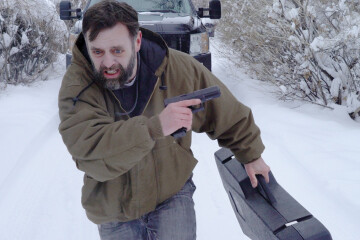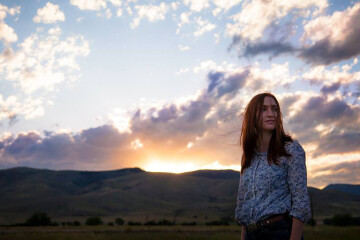Willow Creek Road
Jenna Ciralli is a filmmaker based in Brooklyn, NYC whose short, Willow Creek Road—which she produced, co-wrote and stars in—will screen at BZN International Film Festival this June 7 – 10. The short film follows a ranch hand, Ruth, in Montana as her day unfurls. The film is gorgeously realized and is a testament to the beauty of Montana— a personal touch, as Ciralli was born in Bozeman and raised in Great Falls, MT. Ciralli will return to Bozeman for BZN, but until then I sat down with her to discuss the film, her indulgences, and how Montana continues to shape her work.
Phoebe Lewis: Willow Creek Road opens with a woman mending a fence. Why did you choose to open with that particular shot?
Jenna Ciralli: I think that particular shot had a lot to do with my director Francesca Mirabella. We had a very strong collaboration; [I] brought a script to her that was a working draft but wasn’t quite there yet. She took it and ran with it and elevated it to that kind of imagery that you see. It was important to her that Montana was always a very strong character, and there was an authenticity to the story in terms of place. So much of that is working with the land and being with the land.
By having a female director and protagonist, we’re already looking through the female gaze, [subverting] a traditionally male character like the ranch hand. So much of my journey to get here, and so much of what’s happening in the industry, is to create content with a female lead that both men and women can relate to on a human level.
PL: Why did you choose to set the film in the West, and Montana in particular?
JC: This festival is very meaningful to me; it’s a homecoming on many levels. While I was born in Bozeman, I grew up in Great Falls, MT. I was out of state from 18 onwards, went to college in Oregon and then ventured my way out to New York City. I’ve been in New York for 12 years now.
When I was originally coming up with this idea [for the film], the seed of it was about a woman who was unable to have children. We had originally imagined it in New York City, but it never felt quite right. For me, I think it was a desire to return home in terms of the filmmaking process. I got married in Montana, and I’m more relaxed there. There are more resources, I feel, that are readily available to a filmmaker when you’re just starting out and not working with a big budget. The land speaks for itself, and it gives you everything. That was a no-brainer in terms of aesthetic, and again, in not having a huge budget with lights, sets, and all the ornate things I didn’t have access to.
PL: Where did you film in Montana?
JC: We filmed in the Springhill area outside of Bozeman, and we filmed in Paradise Valley. The opening shot was taken at Mallard’s Rest, and then we filmed in Emigrant, Montana.
We made filming an event. We took the whole crew to Yellowstone, we went to Chico Hot Springs. I got to rediscover Montana through their eyes and that was really meaningful to me. Having them see the Lower Falls – it was amazing. I think they signed on to the project for the chance to film in Montana more than they did for me!
PL: You’ve mentioned Terrence Malick as an influence in your cinematic style. Who else influences your work?
JC: Terrence Malick was an influence for Francesca and Sheldon (the film’s DP) – they studied some shots of his and brought it to Willow Creek Road, so there was a classic sense of cinema in the film. There was also a lot of influence coming from classic Westerns. Personally, I’ve been influenced by the work of Kelly Reichert, who I think is one of the main women right now rediscovering what the Western looks like through the female gaze. [Reichert’s films include Certain Women and Wendy & Lucy]. We completed Willow Creek Road before I saw Certain Women, and I was delighted to see parallels between our protagonist and Lily Gladstone’s character, The Rancher.
I identify as an actor and as a producer, and they’re two very different things. I’m also beginning to gain confidence as a writer, so I’m inspired by women like Greta Gerwig who have relied on their writing to be a vehicle for their acting and directing. Her career began with her writing and then she took it to a whole new level by directing Ladybird.
As an actor and writer you understand you’re a storyteller, first and foremost. Your acting is strengthened by knowing the arc of the movie and where your character needs to go to hit certain beats, to make the story clear. And when you add producer to the mix, it ups the stakes for each leg of the film’s journey you work on. I find it very feminine in style to multi-task in this way.
PL: What was it like working on a project helmed by women and about a woman?
JC: Willow Creek Road felt like a very individual journey with Francesca and I trusting one another to play to our strengths. Our editor Amy Adair and composer Herdís Stefánsdóttir equally came to the project with their own unique voices. They all seemed to understand the vision intuitively, and I trusted them. I had to be in a very solitary space to play Ruth. You’re in her head, you’re feeling her feelings and thinking her thoughts and seeing how she views the world. She seems to be stunted socially, but she has this rich emotional life and sense of poetry in her head. It didn’t feel female in experience per se; it felt human.
Being in New York City for 12 years has brought its share of failures as well as successes, and the failures have been deeply painful, like if a play didn’t land with the critics or a certain project didn’t get on its feet. That sense of an artistic miscarriage guided me through the literal miscarriage that Ruth was facing in her life in Willow Creek Road.
I work with another group of women based from a viral video we created, called Casting Call: The Project. [The short video portrays low-brow casting breakdowns to drive home the point of needing more complex and challenging content for women.] Casting Call was released in March 2016 and amassed 2.4 million views online in one week. It came before Me Too, before Time’s Up; we were shocked because it had a global impact and we thought it would just be passed around in our circles in New York. With that community of women, we’re working on a short film right now, with a foundation based in activism for underrepresented voices. With that work I feel most aware of working with women due to the activism piece and constant discourse. We’ve created an artistic short hand based in different skills that work together as a collective whole.
PL: We don’t see many films in which women are comfortable in nature; is that something you were aware of while writing and filming Willow Creek Road?
JC: I was probably unconsciously aware of it but couldn’t name it at the time. When you are working to create a new narrative, you are really in conscious dialogue with what you’ve seen before. We’re so used to seeing the landscape in a masculine way from the Westerns we’ve watched our whole lives. To get inside a woman’s head and see how she reacts with the landscape is something I feel I haven’t seen in the classic Westerns that we get from bigger production houses.
Also, a lot of films that deal with a relationship to the land are period pieces, in which women and men are both uncomfortable because they are telling survival tales in harsh elements. So, yes, with Willow Creek Road the land is the place of comfort for our lead character. It wasn’t a deliberate choice at all; it happened organically based on how the land comforts me, and Francesca was really astute in picking up on that. The voice-over used in the film is all her.
PL: What’s next for you?
JC: I wrote a short film, also based in Montana, called Tessa Returning that is in development right now. Francesca and I want to do a feature that would involve a similar aesthetic as Willow Creek Road but we would divert from the story. We are interested in a Modern Day Western, Cain and Abel sibling rivalry tale, but with sisters on a Montana ranch.
PL: Do you have any fun plans for when you’re in Bozeman for the festival?
JC: I like walking down Main Street from the Co-op to the Public Library and seeing old familiar sights like the Baxter Hotel and Bangtail Bikes with the big rotating horse on the corner … the Public Library was so good to us; that’s where we auditioned our actors, and we had our first private screening there. There’s this tremendous sense of ease and support from the community when I come home…when I was growing up in Montana I would take long walks and let my mind wander and my imagination soar.
Don’t miss Willow Creek Road at BZN International Film Festival this June 7 – 10! Filmmaker Jenna Ciralli will attend to present her film and discuss the project following the screening. Passes are now on sale at Old Main Gallery on E. Main Street, or online at www.bozemanfilmcelebration.com


